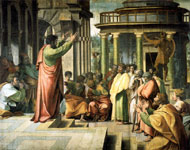I have been sharing from the early chapters of the book of Acts the impact of the Day of Pentecost. Peter and John, in the name of Jesus, had healed the lame man at the gate of the Temple, and the crowd saw it and were amazed. Peter took the opportunity to tell the people about Jesus, and three thousand believed. Then the temple guards arrested them and they faced the Sanhedrin the next day, who “took knowledge of Rather than encourage the presence of God in their midst, they didn’t like the concept that power was in “the name of Jesus” rather than in the authority of the Jewish faith. And being Sadducees they did not want to see the supernatural in action and everyone getting excited, rather than being humble and worshipping quietly. These attitudes have persisted until today. One time when I was teaching in upstate New York in the U.S. I had a phone call from a pastor, as some of his members had been invited to hear me speak. He boldly asked me what I was going to speak about — I was on his turf and he was concerned about his authority as a pastor. I was tempted to say “about God and about 20 minutes,” which is an old joke between my wife Vivien and I about what to teach next Sunday. So Peter and John were brought before the authorities again and they “charged them not to speak or teach at all in the name of Jesus. But Peter and John answered them, ‘Whether it is right in the sight of God to listen to you rather than to God, you must judge, for we cannot but speak of what we have seen and heard.'” (Acts 4:18-20). This was the “boldness” of Peter and John that verse 13 spoke about. They had simply done what God guided them to do, and they were going to keep on doing it. When they were let go, they joined the other apostles and prayed. “And now, Lord, look upon their threats and grant to your servants to continue to speak your word with all boldness, while you stretch out your hand to heal, and signs and wonders are performed through the name of your holy servant Jesus” (Acts 29-30). Two important keys to the book of Acts are right there in the prayer: speak God’s Word with boldness, and meet needs in the authority of the name of Jesus. And the indwelling spirit of God has all the strength and wisdom you need to speak the Word and do the Word. Note that boldness doesn’t imply shouting, and shouting does not imply anointing. Boldness is saying what God wants to be said regardless of who is listening. I change channels when someone is shouting at me. Shouting while preaching is more often than not a sign that the argument being made is weak. I’m sure some preachers have a side-note in their outline which says “shout here” or “cry here!” God acknowledged their prayer by a special miracle. “And when they had prayed, the place in which they were gathered together was shaken, and they were all filled with the Holy Spirit and continued to speak the word of God with boldness” (verse 31). What a marvellous token of God’s presence and power! “And with great power the apostles were giving their testimony to the resurrection of the Lord Jesus, and great grace was upon them all” (verse 33).  We take up the record in verses 16 and 17. The religious authorities now had a problem! “What shall we do with these men? For that a notable sign has been performed through them is evident to all the inhabitants of Jerusalem, and we cannot deny it. But in order that it may spread no further among the people, let us warn them to speak no more to anyone in this name.” Even worse, the people who saw it were their own “church members,” as this happened on their own doorstep! As a result of Peter’s teaching 8,000 men were added to the believers.
We take up the record in verses 16 and 17. The religious authorities now had a problem! “What shall we do with these men? For that a notable sign has been performed through them is evident to all the inhabitants of Jerusalem, and we cannot deny it. But in order that it may spread no further among the people, let us warn them to speak no more to anyone in this name.” Even worse, the people who saw it were their own “church members,” as this happened on their own doorstep! As a result of Peter’s teaching 8,000 men were added to the believers.
Great power and great grace
[these unlearned and ignorant] men, that they had been with Jesus” (Acts 4:13). Read my previous newsletters about these amazing events.



Leave A Comment